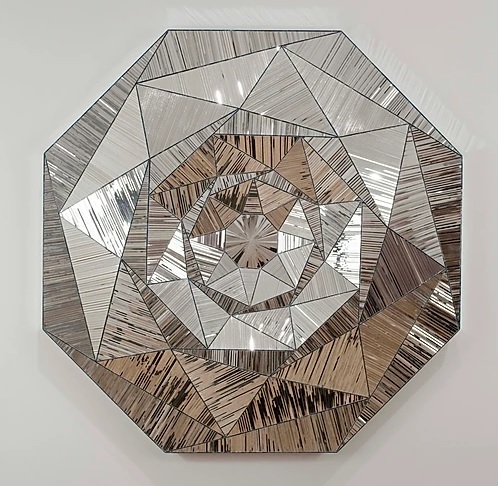FWP:
SETS == A,B; KIH;
PARALLELISM
MIRROR: {8,3}
TAMASHA: {8,1}
Here's a classic 'A,B' verse, in which we have to decide for ourselves what relationship exists between the two basically parallel-looking lines. The first line, thanks to the versatility of that little kih , has two possible readings:
=Why would I not give a mirror, so that they would call the mirror, or the giving of it, a 'spectacle'
(with the kih clause taken as stating a desired effect)?
=Why would I not give a particular kind of mirror-- the kind
of mirror that they would call a 'spectacle' (with the kih
clause taken as describing the kind of mirror)?
In order to resolve the possible readings of the first line, we turn to the second line-- and as so often, it starts afresh in terms of grammar and vocabulary. For once, the second line is a little more straightforward than the first; but it's still not exactly clear what connection exists between the two. Both lines are questions, and thus the verse is as inshaa))iyah as it can possibly be.
Above all we must decide, to what does the 'such a one' [aisaa] refer? If we interpret it in the light of the first line, it might very well be the mirror-- which, depending on our reading, is either a mirror in general, or a particular kind of mirror. Or, in the light of the second line, 'such a one' could be any (grammatically masculine) entity that some 'they' (unspecified) would declare to be 'like you'.
If both lines are taken as describing the same basic situation, then the reason the speaker wouldn't give a mirror is that he can't find one: the 'mirror' would then be a 'mirror-image' of the beloved, such that people would consider it a great 'spectacle' to see the two of 'you' face to face-- except that such a spectacle is impossible to arrange. On this reading, the speaker doesn't have the 'mirror-image' of the beloved.
If the two lines are taken as describing different situations, then the first line might be a counsel of despair-- the speaker might as well go ahead and give them a mirror, and let them have their frivolous enjoyment of such trivial kinds of 'spectacle' as it can offer. For after all, the realest kind of beauty-- a peer of the beloved-- is quite impossible to provide. On this reading, he does have a mirror, but he doesn't have an equal of the beloved.
Who are the 'they' who do the spectacle-viewing and the judging
of likeness? Since no antecedents are at hand, presumably they're people in
general. In this verse, the masculine plural verbs cannot refer
either to the speaker (who identifies himself as 'I') or to the beloved (who
is addressed as an intimate tuu ).


Nazm:
For comparison with you, where would one as beautiful as you be available? Perhaps/but [magar] I will give you a mirror, so that having looked at it, your amazement would become a spectacle for people. (258)
== Nazm page 258